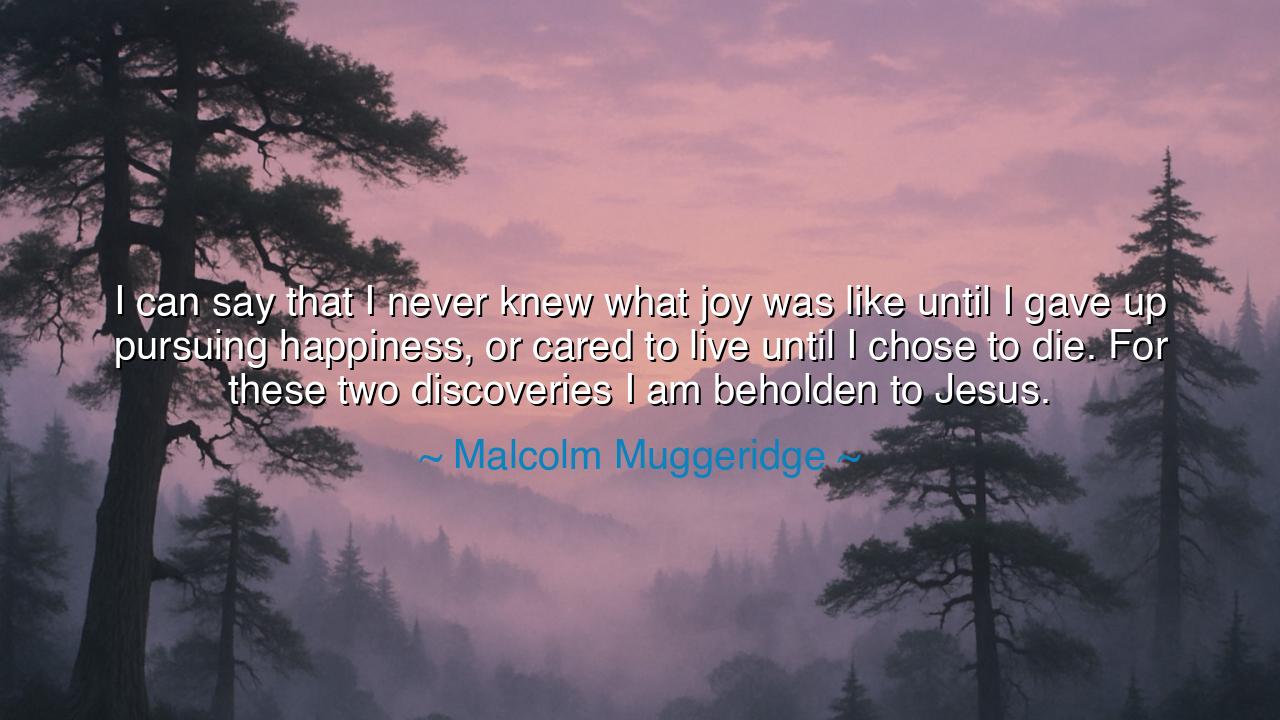
I can say that I never knew what joy was like until I gave up
I can say that I never knew what joy was like until I gave up pursuing happiness, or cared to live until I chose to die. For these two discoveries I am beholden to Jesus.






“I can say that I never knew what joy was like until I gave up pursuing happiness, or cared to live until I chose to die. For these two discoveries I am beholden to Jesus.” — Thus spoke Malcolm Muggeridge, the English journalist and philosopher whose life was a pilgrimage from doubt to faith, from irony to illumination. His words echo the timeless paradox that has moved saints and sages through the centuries: that the path to true joy is not through pursuit, but surrender; not through self-preservation, but through the death of the self. What he discovered, through long struggle and spiritual awakening, is that the search for happiness — when pursued as an end — becomes a chain. Only when it is relinquished does the soul awaken to the deeper, quieter joy of being.
In his earlier life, Muggeridge had sought happiness as the world defines it — in success, pleasure, recognition, and experience. A man of intellect and ambition, he walked the halls of power and the studios of fame, yet found his soul growing hollow. He saw that worldly happiness, built upon appetite and vanity, was a mirage that receded the more he chased it. Then, in a moment of awakening, he realized that all striving must die before joy can be born. “I chose to die,” he says — not a physical death, but the death of pride, of self-will, of the endless hunger for control. It was in this surrender, through his encounter with Christ, that he found a joy beyond pleasure, a peace beyond comfort — a joy that asks for nothing, yet fills everything.
The origin of this revelation lies in the Christian mystery of the Cross — that life comes through death, and gain through loss. When Muggeridge writes, “I cared to live until I chose to die,” he echoes the words of Christ: “He who loses his life for My sake will find it.” This truth, ancient as creation itself, has confounded kings and comforted martyrs. To die to the self — to lay down pride, ambition, and desire — is to make room for divine life to enter. For as long as a man clings to his own happiness, he remains enslaved by it; but once he lets it go, he becomes free. And in that freedom, joy, pure and indestructible, begins to bloom.
Consider the story of St. Francis of Assisi, who was once a wealthy young noble, clothed in silk and surrounded by luxury. Yet he found himself unsatisfied — restless amid abundance. One day, he renounced it all: his inheritance, his comfort, even his fine garments. He walked into the world clothed only in humility. In losing everything, he gained the one thing that cannot be bought — the joy of God’s presence. He sang in poverty, smiled in hunger, and embraced even the leper with tenderness. He had ceased to pursue happiness, and so happiness — transfigured into joy — pursued him. Muggeridge, like Francis, found that the soul’s richest feast comes only after it has emptied its plate of desire.
Muggeridge’s insight is also a warning to the restless spirit of modern man. We live in an age that worships happiness — that chases it through possessions, entertainments, and self-fulfillment. Yet the more it is sought, the more it vanishes, leaving behind exhaustion and despair. The pursuit of happiness has become a god that devours its worshippers. Muggeridge’s wisdom calls us back to the ancient path — the path of surrender, of stillness, of trust. Joy, he teaches, is not a prize for effort, but the natural fragrance of a soul that has ceased to grasp and begun to give.
To “choose to die” is not an act of despair, but of liberation. It is the recognition that we are not the masters of our own joy. When we surrender our need to be happy — when we offer our life to something greater — we discover a serenity that no pleasure can rival. It is the joy of being part of something eternal, of being loved not for what we achieve, but for who we are in the eyes of God. This is the joy Muggeridge found in Christ: a joy that does not rise and fall with fortune, but endures through suffering, loss, and even death itself.
So, my listener of the future, take this lesson into your heart: Do not chase happiness; seek truth. Do not cling to life; live by giving it away. When you cease to demand that life please you, life will begin to bless you. When you stop measuring joy, you will begin to feel it. Let go of your need to be first, to be praised, to be fulfilled — and you will find a freedom so vast that even sorrow cannot destroy it. Muggeridge’s discovery is the paradox at the heart of all spiritual wisdom: the way up begins with descent; the way to joy begins with surrender.
And so, as he confessed with humility and gratitude, he owed these revelations to Jesus — the one who first showed mankind that the road to life passes through the cross. For in dying to self, we are reborn. In losing the world, we gain eternity. And in ceasing to pursue happiness, we find at last what we were created for: the unshakable, radiant joy of the soul made free.






AAdministratorAdministrator
Welcome, honored guests. Please leave a comment, we will respond soon